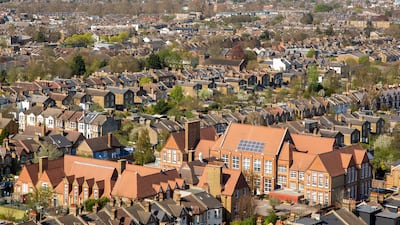UK house prices were steady in October after more than two years of growth, according to surveyors.
Buyers are more cautious because of rising mortgage costs, the Royal Institution of Chartered Surveyors said.
And amid an imbalance between demand from tenants and the supply of homes to let, rents are expected to continue heading upwards.
Two per cent of property professionals reported house prices falling rather than rising across the UK as a whole.
This brought to an end a 28-month sequence of positive readings.
But some parts of the UK are still recording growth in house prices.
Property professionals in Scotland and Northern Ireland continue to report a reasonably firm upwards trend in house prices even if the pace of growth is softer than earlier in the year, Rics said.
By contrast, those in areas such as East Anglia and the South-East of England were seeing decreases.
Airbnb's 10 most wish-listed unique properties - in pictures
Professionals across all parts of the UK are now, on balance, of the opinion that house prices will fall over the year ahead.
New buyer inquiries fell for the sixth month in a row in October, and survey feedback on buyer demand was negative across the UK, Rics said.
It now takes 18 weeks on average to sell a property, up from 16 weeks typically a year ago.
In the lettings market, tenant demand continues to rise at a solid pace, with a net balance of 46 per cent of survey participants noting an increase in October.
At the same time, landlord instructions fell. Given this mismatch, rents are expected to be driven higher over the near term — about 4 per cent higher in a year's time.
“The latest feedback to the Rics survey provides further evidence of buyer caution in the face of the sharp rise in mortgage costs," said Simon Rubinsohn, the chief economist of Rics.
“As a result, the volume of activity is likely to slip back over the coming months and realistic pricing is now much more important to complete a sale.
“The settling down in financial markets could provide some relief, although it may be premature to assume this will be reflected in a reduction in lending rates any time soon.
“However, the employment picture remains critical to the medium-term outlook and for the time being, that remains solid.
“As far as the lettings market is concerned, the imbalance between demand and supply still appears unusually extended, leading to rent expectations in the survey remaining at elevated levels, and it is difficult to see this changing any time soon in the current environment.”
Why 2022 may well be the year to buy property - in pictures
One estate agent in Yorkshire and the Humber was quoted in Rics’ latest report as saying: “The market slowed dramatically in October following the mini-budget bombshell but there were signs it was slowing before this.”
Another, in Scotland, said: “Certain sectors of the market are still performing well, particularly well-presented properties in good condition.
"Demand will, however, be impacted by increasing mortgage rates. Unpredictable times ahead.”
Tom Bill, head of UK residential research at estate agent Knight Frank, said: “October was undoubtedly a bad month for the UK property market but it hasn’t necessarily set the tempo for what comes next.
“As the impact of the mini-budget fades, mortgage rates will calm down before stabilising.
“The downwards pressure on prices will reduce to some degree as the economic and political backdrop becomes less disorientating.
“However, after growth of 25 per cent during the pandemic, we believe it’s a reasonable assumption that house prices have now peaked.
“We don’t expect the sort of cliff-edge moment seen during the financial crisis but we expect prices to fall back to the level they were at in summer 2021 as rates normalise after 13 years.”
The findings were released as it was reported that Britain's high house prices have deepened inequality in recent decades, leaving younger generations struggling to earn enough to get on the housing ladder.
"The huge growth in house prices has contributed to collapsing rates of home ownership and is acting to push up the amount of the country's wealth held by older generations," the Institute for Fiscal Studies think tank said in a report.
What is a recession? - video
It said that such wealth was "increasingly at the heart of the most pressing economic inequalities today" in Britain, which faces a crisis in the cost of living as wages fail to keep pace with decades-high inflation.
The average UK home price quintupled over the past three decades to £296,000 ($340,600) in August, recent official data showed.
But the market is showing signs of falling, pressed by the cost-of-living squeeze and Bank of England interest rate rises that increased the cost of commercial home loans.
The IFS said on Wednesday that Britons born in the 1980s are far less likely to own a home, compared with those born from the 1940s onwards.
"Because wealth has been growing much faster than income, it is becoming harder for working families to save enough to climb the wealth distribution," the think tank said.
Inherited and parental wealth were becoming increasingly important for young generations.
And the IFS said the coronavirus "pandemic and its aftermath may well have increased wealth, and wealth inequalities, further".
How to prepare for a recession - video
"Increases in saving were greatest for the most well-off and rises in asset prices also benefited them" during Covid lockdowns.
IFS deputy director Robert Joyce said younger generations could no longer be certain of enjoying the same wealth as those who came before them.
"A generation of Britons has ridden a wave of growing asset prices, pushing up the value of their houses and investments," Mr Joyce said.
"Meanwhile, more than a decade of stagnant earnings has held back younger generations for whom earning their own economic success has become increasingly difficult.
"The fact that we can no longer be sure that the young will grow up with living standards that match their predecessors is a remarkable social change."





















